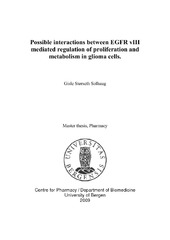Possible interactions between EGFR vIII mediated regulation of proliferation and metabolism in glioma cells
Master thesis
Permanent lenke
https://hdl.handle.net/1956/3648Utgivelsesdato
2009-05-20Metadata
Vis full innførselSamlinger
Sammendrag
The life cycle of a normal cell is strictly controlled by multiple check points and regulatory factors. Cancer cells on the other hand contain defects in the regulatory machinery that govern cell proliferation and homeostasis, which in turn may lead to tumor formation. For the majority of cancer cells a number of characteristic features seem to contribute to the tumor development. These physiological changes include; insensibility to growth-inhibitory signals, inhibition of programmed cell death, self-sufficiency in growth signals, sustained angiogenesis, limitless replicative potential and tissue invasion and metastasis. In addition to uncontrolled cell proliferation, most tumors are also characterized by specific changes in energy metabolism. Tumor cells tend to take up large amounts of glucose and secrete lactate. The fact that cancer cells may generate many of their needed growth signals reduces their dependence of stimuli from other tissues. Some of these signals can be sensed by the epidermal growth factor receptor (EGFR) and may contribute in the regulation of tumor cell metabolism and proliferation.
Utgiver
The University of BergenOpphavsrett
Copyright the author. All rights reservedThe author
